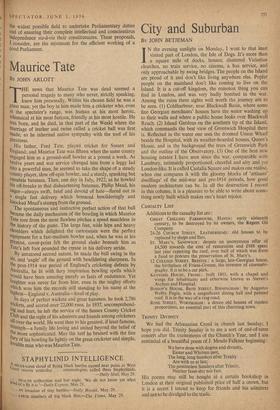Maurice Tate
IlY JOHN ARLOTT' THE news that Maurice Tate was dead seemed a personal tragedy to many who never, strictly speaking, knew him personally. Within his chosen field he was a great man; yet the boy in him made him a cricketer who, even at the spectator's range, was human at his most heroic, whimsical at his most furious, friendly at his most hostile. He Was born, and he died, in that part of the Weald where the Marriage of leather and twine called a cricket ball was first made; so he inherited native sympathy with the tool of his greatness.
His father, Fred Tate, played cricket for Sussex and England; and Maurice Tate was fifteen when the same county engaged him as a ground-staff bowler at a pound a week. As twelve years and war service changed him from a leggy lad into a powerful man, he seemed to take the shape of a steady County player, slow off-spin bowler, and a sturdy, spanking but unsubtle batsman. Then, one day in July, 1922, as he bowled Ills off-breaks to that disheartening batsman, Philip Mead. his auger—always swift, brief and devoid of hate—flared out in it single fast delivery which bounced bewilderingly and knocked Mead's stumps from the ground. , The spontaneous and instinctive perfect action of that ball became the daily mechanism of the bowling in which Maurice Tate tore from the most flawless pitches a speed matchless in the history of the game. The large feet, wide hips and heavy Shoulders which delighted the cartoonists were the perfect equipment for a fast-medium bowler and, when he was at his greatest, cover-point felt the ground shake beneath him as rate's left foot pounded the crease in his delivery stride. By untutored second nature, he made the ball swing in the Mr. and `angle' off the ground with bewildering sharpness. In the post-1914 war period of England's cricketing defeats by Australia, he lit with fiery inspiration bowling spells which Would have been amazing merely as feats of endurance. Yet laughter was never far from him, even in the mighty efforts Which won him the records still standing to his name at the highest—England v. Australia—level of play. . In days of perfect wickets and great batsmen, he took 2,786 Wickets, and scored over 22,000 runs. In 1937, uncomprehend- ing and hurt, he left the service of the Sussex County Cricket C, lub and the sight of his admirers and friends among cricketers all over the world. He went then to his greatest, if least famous. triumph—a family life loving and united beyond the belief of fury more sophisticated. May the turf he bruised with the fine lovable of his bowling lie lightly on the great cricketer and simple, 'uvable man who was Maurice Tate.


































 Previous page
Previous page